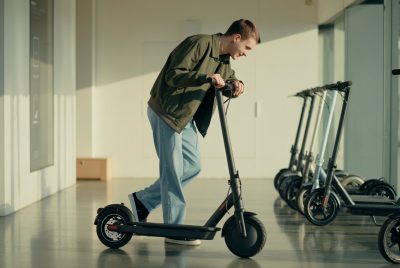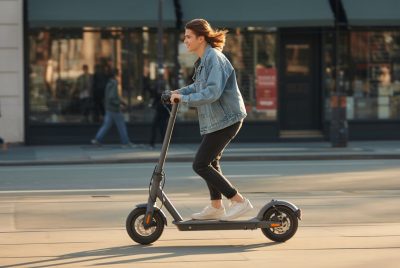Is an Electric Scooter a Motorized Vehicle? All You Need to Know
*We may earn a commission for purchases made using our links. Please see our disclosure to learn more.
Have you ever wondered if your electric scooter counts as a motorized vehicle? This question confuses many riders. Different places have different rules about electric scooters. Some treat them just like bikes, while others say they need the same paperwork as cars.
Here’s an interesting fact: in some states, you might have to register your electric scooter at the DMV just like a car! Our blog will guide you through what makes an electric scooter a motorized vehicle and how this affects you.
We cover everything from safety standards to what to do if you get hurt riding one.
Keep reading for all the details!
Definition and Classification of Electric Scooters
Electric scooters are classified as motorized vehicles in some states, while they are considered personal mobility devices in others, leading to varying regulations and requirements across different locations.
Understanding how electric scooters are defined and categorized is crucial for navigating the complex realm of transportation laws and regulations.
Considered motorized vehicles in some states
In some states, electric scooters fall under the category of motorized vehicles. This classification subjects them to similar regulations that cars and motorcycles must follow. Riders may need a driver’s license, registration from the DMV, and adherence to highway safety standards.
These requirements aim to ensure the safety of both the scooter riders and other road users.
Regulations can vary significantly across different areas, making it crucial for electric scooter owners to stay informed about their local laws. For instance, riding an electric scooter on the sidewalk might be allowed in one city but prohibited in another due to these distinctions in classification.
Owners also face specific responsibilities when their scooters are deemed motorized vehicles. They must understand traffic laws applicable to motorized vehicles, including those concerning street-legal operation and parking spaces designated for such transport modes.
Knowledge about these rules helps prevent fines and enhances overall road safety.
Regulated as personal mobility devices in others
Some states classify electric scooters as personal mobility devices, allowing them to be used in designated pedestrian areas and bike lanes. In these places, electric scooters may not require registration or a driver’s license, making them more accessible for short commutes and leisurely rides.
However, it is important to check your local regulations on where you can legally ride your electric scooter.
In contrast to being classified as motorized vehicles in some states, considering electric scooters as personal mobility devices reflects a different approach to urban transportation.
Regulatory Perspectives on Electric Scooters
Regulatory perspectives on electric scooters vary by state and city, with different DMV registration requirements and highway safety standards applying. Different states have distinct regulations for classifying electric scooters as personal mobility devices or motorized vehicles.
Vary by state and city
Electric scooter regulations vary by state and city. Different locations impose different rules and requirements for electric scooters, from age restrictions to where you can ride them.
It’s essential to familiarize yourself with the laws in your area, such as DMV registration requirements and highway safety standards. Always check local laws before riding your electric scooter to ensure compliance with the specific regulations in your region.
In some states, electric scooters may be classified as motorized vehicles, while in others, they are considered personal mobility devices. Understanding these distinctions is crucial for safe and legal operation of your electric scooter on public roads or sidewalks.
DMV registration requirements
The rules and regulations for electric scooters vary by state and city. When it comes to DMV registration requirements, here’s what you need to know:
- Check Your State’s DMV Website: Different states have different regulations regarding the registration of electric scooters. Visit your state’s DMV website to find out the specific requirements.
- Registration Process: You may be required to register your electric scooter with the Department of Motor Vehicles (DMV) in your state. This process typically involves submitting an application and paying a registration fee.
- Vehicle Identification Number (VIN): Some states may require electric scooters to have a unique VIN, similar to traditional motor vehicles, as part of the registration process.
- License Plate: Once registered, you may be issued a license plate or sticker that must be displayed on your scooter in accordance with your state’s regulations.
- Renewal Requirements: Just like with other motor vehicles, there may be renewal requirements for your electric scooter registration, including regular fees and documentation updates.
- Emission Standards: Depending on the state, there may be emission standards that your electric scooter must meet to qualify for registration.
- Local Regulations: Be aware of any local ordinances or additional requirements specific to your city or municipality concerning the registration and use of electric scooters on public roads and thoroughfares.
Understanding these DMV registration requirements will help ensure that you are in compliance with local laws when riding your electric scooter.
Highway safety standards
Highway safety standards for riding electric scooters are crucial for ensuring the safety of riders and other road users. Adhering to these standards is essential to prevent accidents and injuries. When riding an electric scooter on the road, it is important to:
- Follow all traffic laws, including obeying traffic signals and signs.
- Stay within designated bicycle lanes whenever possible to avoid obstructing other vehicles.
- Ensure compliance with proper licensing requirements for operating an electric scooter on public roads.
- Adhere to local registration requirements for electric scooters.
- Familiarize yourself with highway safety standards specific to electric scooters in your area.
Following these safety standards will contribute to safer and more responsible use of electric scooters on public roads.
Safety Standards for Riding Electric Scooters
Riding electric scooters requires following traffic laws and staying in designated bike lanes. Proper licensing requirements must be met to ensure safe and legal operation.
Following traffic laws
When riding an electric scooter, it is crucial to follow traffic laws. Obeying speed limits and traffic signals ensures your safety and the safety of those around you. Using hand signals when turning and yielding to pedestrians and other vehicles are essential practices for a smooth commute.
Keeping a safe distance from cars and staying visible with proper lighting also contribute to a secure ride.
Ensuring that you adhere to all traffic laws guarantees that you can enjoy your electric scooter while promoting overall road safety. Always remember to be aware of local regulations, as they may vary depending on where you’re riding.
Staying in bike lanes
When riding your electric scooter, always stay in bike lanes where available. Riding in the designated bike lane helps to ensure the safety of both yourself and other road users. By staying within the marked boundaries, you can minimize conflicts with pedestrians on sidewalks and avoid obstructing motor vehicle traffic.
Staying in bike lanes is not only a matter of safety but also a legal requirement in many areas. It’s important to adhere to local traffic laws and regulations regarding electric scooters.
Doing so will contribute to safer and more efficient commuting for everyone sharing the roadways.
Proper licensing requirements
Before riding an electric scooter, you must ensure that you have the proper licensing. Most states require a valid driver’s license or permit to operate an electric scooter on public roads.
Make sure to check your state’s specific requirements for the type of license needed, as it may vary. Additionally, some localities may have additional regulations regarding the use of electric scooters, so it’s crucial to familiarize yourself with these rules before hitting the road.
When operating your electric scooter, remember to carry your driver’s license or permit with you at all times in case you are asked by law enforcement to provide identification. It is essential to adhere to all licensing requirements and regulations in order to enjoy a safe and legal ride on your electric scooter.
What to Do If You Are Injured on an Electric Scooter
If injured on an electric scooter, contact a personal injury attorney immediately to understand liability and compensation options. Read more for essential information about electric scooter safety and regulations.
Contact a personal injury attorney
In the event of an accident while riding your electric scooter, it’s crucial to contact a personal injury attorney who specializes in these cases. They can help you understand your rights and navigate through the legal complexities surrounding electric scooter accidents.
A knowledgeable attorney will assist you in seeking compensation for medical expenses, lost wages, and other damages resulting from the incident. It’s important to have a legal expert who is well-versed in local laws and regulations regarding electric scooters by your side as you pursue any necessary claims or lawsuits.
If injured on an electric scooter, reaching out to a personal injury attorney with experience in handling such cases is essential. An attorney familiar with electric scooter laws can provide valuable guidance on liability and compensation options specific to your situation.
Understanding liability and compensation options
After contacting a personal injury attorney, it’s crucial to understand liability and compensation options if you are injured while riding an electric scooter. A knowledgeable personal injury attorney can guide you through the legal process and help determine who may be liable for your injuries.
They can also assist in identifying potential avenues for compensation, such as insurance coverage or pursuing a legal claim against the responsible party.
Understanding liability and compensation options is essential in navigating the complexities of personal injury cases involving electric scooters. It’s important to be aware of local laws and regulations that may affect your ability to seek compensation for your injuries.
By being informed about your rights and available legal remedies, you can make informed decisions about how to proceed with seeking compensation for any harm suffered while riding an electric scooter.
Being aware of local laws and regulations.
Understanding liability and compensation options is crucial, but being aware of local laws and regulations is equally important for electric scooter owners. Each state and city may have specific rules when it comes to the operation of electric scooters on public roads and sidewalks.
It’s essential to familiarize yourself with street legal requirements, transportation regulations, and urban mobility laws in your area. Knowing the specific guidelines for electric scooter usage can help you avoid fines or penalties while ensuring a safe and legal riding experience.
Staying informed about motorized vehicle laws, scooter classification, and licensing requirements for electric scooters can ensure that you comply with all necessary regulations. Familiarizing yourself with highway safety standards for electric scooters will allow you to navigate the everchanging realm of transportation rules more confidently.
Conclusion
When riding an electric scooter, it’s crucial to be aware of the varied regulations across different states and cities. Always adhere to traffic laws and use bike lanes when possible for your safety and that of others around you.
If you find yourself injured while on an electric scooter, seek legal counsel familiar with local laws and regulations to understand your rights. Understanding the rules and safety standards is essential for a smooth ride on the roads or sidewalks.
FAQs
1. What is a motorized scooter?
A motorized scooter is a small platform with two or more wheels powered by an electric motor, allowing it to move without manual effort.
2. Are electric scooters considered motorized vehicles?
Yes, electric scooters fall under the category of motorized vehicles because they use an electric engine for movement and must follow specific road regulations.
3. Do I need a driver’s license to ride an electric scooter?
In many places, you do need a driver’s license to ride an electric scooter on public roads since they are classified as street-legal vehicles. However, laws vary by state.
4. Can I ride my electric scooter on the sidewalk?
The rules about riding an electric scooter on the sidewalk differ from one area to another. It’s important to check local electric vehicle rules and guidelines before doing so.
5. What are the legal requirements for riding an electric scooter?
Legal requirements for riding include following specific driver’s license requirements, adhering to street-legal vehicle regulations, and understanding both state-specific and general electric scooter laws.




